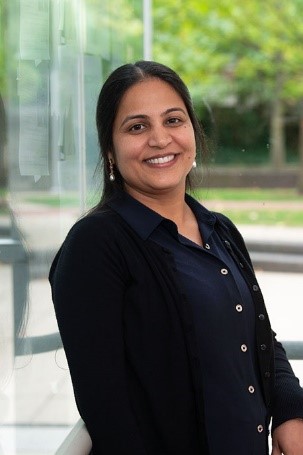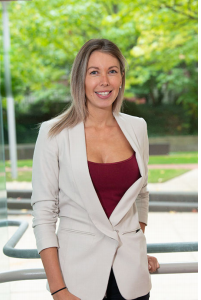Healey Family ALS Endowed Chair for Research and the Healey Scholars
Healey Family ALS Endowed Chair for Research
 On May 20, one of the world’s leading ALS researchers, Clotilde Lagier-Tourenne, MD, PhD, was named the inaugural incumbent of the Healey Family ALS Endowed Chair for Research. Dr. Lagier-Tourenne’s creativity and skill have already led to the identification of a disease pathway common to all forms of ALS, and indeed, all neurodegenerative diseases. When Dr. Lagier-Tourenne and Healey Center Advisory council member Dr. Kevin Eggan published back-to-back research on the promise of STATHMIN-2, suggesting that ALS might be treated by restoring this protein, the Healey Center advisory council made pursuing that work a priority.
On May 20, one of the world’s leading ALS researchers, Clotilde Lagier-Tourenne, MD, PhD, was named the inaugural incumbent of the Healey Family ALS Endowed Chair for Research. Dr. Lagier-Tourenne’s creativity and skill have already led to the identification of a disease pathway common to all forms of ALS, and indeed, all neurodegenerative diseases. When Dr. Lagier-Tourenne and Healey Center Advisory council member Dr. Kevin Eggan published back-to-back research on the promise of STATHMIN-2, suggesting that ALS might be treated by restoring this protein, the Healey Center advisory council made pursuing that work a priority.
Trained as a medical geneticist and a neuroscientist, Clotilde earned both her MD and PhD in Strasbourg France, before receiving further training in Medical Genetics at Columbia University. She arrived at Mass General in 2015, and her lab is based at the MassGeneral Institute for Neurodegenerative Disease where she focuses on pathways and mechanisms at the molecular level. Dr. Lagier-Tourenne works seamlessly with our care teams, meeting regularly with Dr. James Berry, who leads our Multidisciplinary ALS Division. Those meetings offer opportunities to share ideas and refine laboratory investigations based on the needs of patients in the clinic.
“I am so grateful for the opportunity to serve in this newly created position,” Dr. Lagier-Tourenne said. “The opportunity to work closely with the clinicians and patients in the Healey Center provides me with a unique perspective on my lab research, while connecting me to the individuals who will be affected by our success.”
Dr. Lagier-Tourenne has been honored with many awards for her new approach to understanding the causes of ALS, including the 6th International Medicine Paulo Gontijo Award, which recognizes the most promising scientist under the age of 40 working on ALS; the Milton-Safenowitz Postdoctoral Fellowship from the ALS Association, the Muscular Dystrophy Association Career Development Award, the Frick Foundation 2013 Award (conjointly with Dr. Luc Dupuis) and the 2017 Grass Foundation – American Neurological Association Award in Neuroscience.
Together with Dr. Berry, Dr. Lagier-Tourenne hosts monthly Translational ALS Research Collaboration Meetings that have become a hugely successful incubator. Countless collaborations have emerged from these meetings that are advancing the science around ALS in exciting ways. These exchanges have been so fruitful, participation now extends to post-docs beyond Mass General to all the Harvard-and Massachusetts-based ALS labs.
“We are making great progress in our research,” Dr. Lagier-Tourenne says. “The collaborative nature of our basic and clinical research helps to keep us on track, opens us up to unexpected pathways and ideas, and keeps us focused on the patients who need us.”
A protein called transactive response DNA-binding protein 43 (TDP-43) as emerged as a crucial player in ALS. Indeed, TDP-43 is involved in both familial and sporadic forms of the disease. TDP-43 is necessary for the processing of over 1,500 RNAs in neurons and its disruption leads to neuronal death. One of the major discoveries from Dr. Lagier-Toureene’s laboratory this year was that a major consequence of TDP-43 malfunction is the loss of an important protein called stathmin-2, which is involved in axon maintenance and regeneration after injury. With this new knowledge, Healey Center researchers are now developing therapeutic strategies to restore stathmin-2 levels in ALS patients, including those with the C9orf72 gene. Understanding this protein is also providing valuable opportunities to develop treatments for other neurodegenerative diseases affected by a malfunctioning TDP-43 including frontotemporal dementia and Alzheimer’s disease.
Healey Scholars
This year’s Healey Scholars are dedicated to advancing the research around the effect of STATHMIN-2 on ALS.

Nibha Mishra, PhD, trained as a neuro-pharmacologist. She earned her PhD in India, identifying some potent small molecules towards development of therapeutics for Alzheimer’s disease. Dr. Mishra’s initial postdoctoral training was at the Hebrew University of Jerusalem, Israel. Her research work included the investigation of clinically relevant microRNA in the brain. She received two prestigious fellowships for her work on microRNAs in neurodegenerative diseases. She pursued her passion for RNA biology and joined Dr. Clotilde Lagier-Tourenne’s laboratory in 2017 to investigate the role of RNA-binding proteins in ALS.
“I began my investigation by using a CRISPR/Cas9 editing technique to study an inherited form of ALS, and now I am leveraging my collaboration with the Broad Institute to apply that same CRISPR/Cas9 technique to identify genes regulating STATHMIN-2, a protein recently identified to play a central role in sporadic ALS. A better understanding of the molecular changes caused by ALS is crucial to developing new therapeutic avenues for ALS patients,” Dr. Mishra says.

Leslie, Nash, PhD, joined Dr. Kevin Eggan’s lab at the Harvard Stem Cell Institute in April 2019. She earned her PhD in biochemistry at the University of Ottawa. Dr. Nash’s interest in biotechnology and gene therapy resulted in her passion for identifying novel approaches to developing treatments for neuromuscular and neurodegenerative diseases, ultimately leading her to research in ALS, and particularly in stem cell biology within Dr. Eggan’s lab.
“Dr. Mishra and I work in parallel with each other,” Dr. Nash says. “While her team explores genetic sequencing and the response to STATHMIN-2, I am working on identifying how STATHMIN-2 could be used as a biomarker that will allow us to diagnose ALS earlier, predict disease progression, and determine an individual's response to new and upcoming therapeutics."
“We are all driven to find the cure,” Dr. Nash says. “Our collaboration with Mass General’s clinical team allows us access to patient stem cells and biofluid, which helps us to examine neuronal activity and degeneration during disease progression, while also providing us with the potential to identify novel biomarkers and therapeutic targets for further testing in engineered mouse models of ALS.”
The Healey Center plans to issue a global call for applications to the Healey Scholar program in January 2020. This two-year opportunity is unique in its focus on both ends of therapy development – academic research that identifies disease mechanisms and drug targets and industry efforts to develop drugs. No other fellowship supports this collaborative approach, but at the Healey Center we know this partnership is the most efficient way to get to the cures. Our goal is to fund two scholars each year, encouraging early career postdoctoral researchers to focus on advancing ALS research from a wide range of perspectives. We are eager to endow this program to ensure these positions are available in perpetuity and are looking for philanthropic support.
HEALEY ALS Platform Trial
Find out about the innovative new HEALEY ALS Platform Trial, which is accelerating efforts to bring new ALS treatments to patients.
Make a Difference for the Healey Center
Join our quest to discover life-saving therapies for individuals who are affected by ALS. The key to our success is our dedication to collaboration. At the Sean M. Healey and AMG Center for ALS at Mass General, we partner with the best clinician-scientists, our patients and friends like you to turn laboratory successes into promising therapies.
